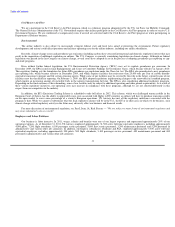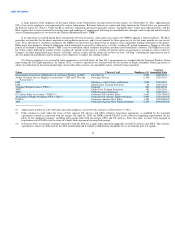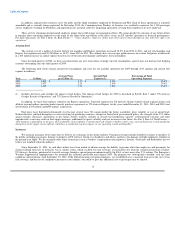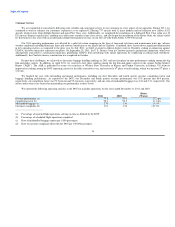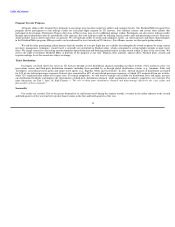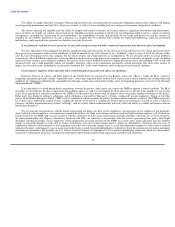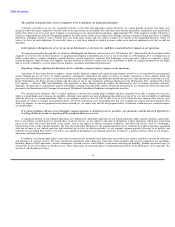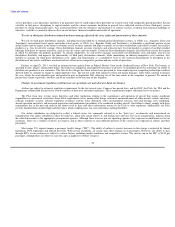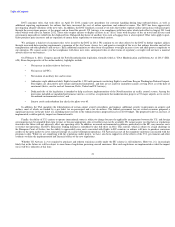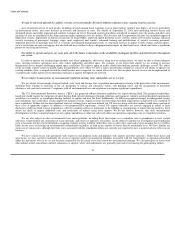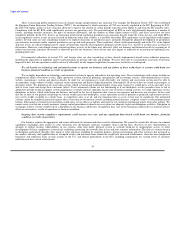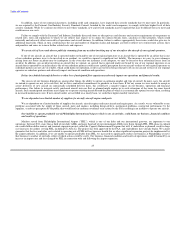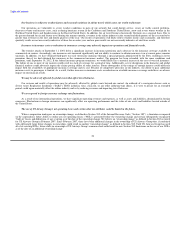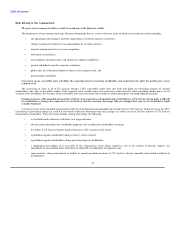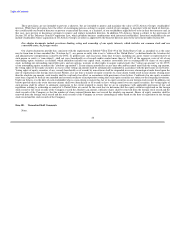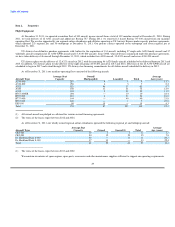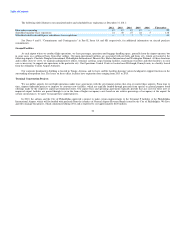US Airways 2011 Annual Report Download - page 23
Download and view the complete annual report
Please find page 23 of the 2011 US Airways annual report below. You can navigate through the pages in the report by either clicking on the pages listed below, or by using the keyword search tool below to find specific information within the annual report.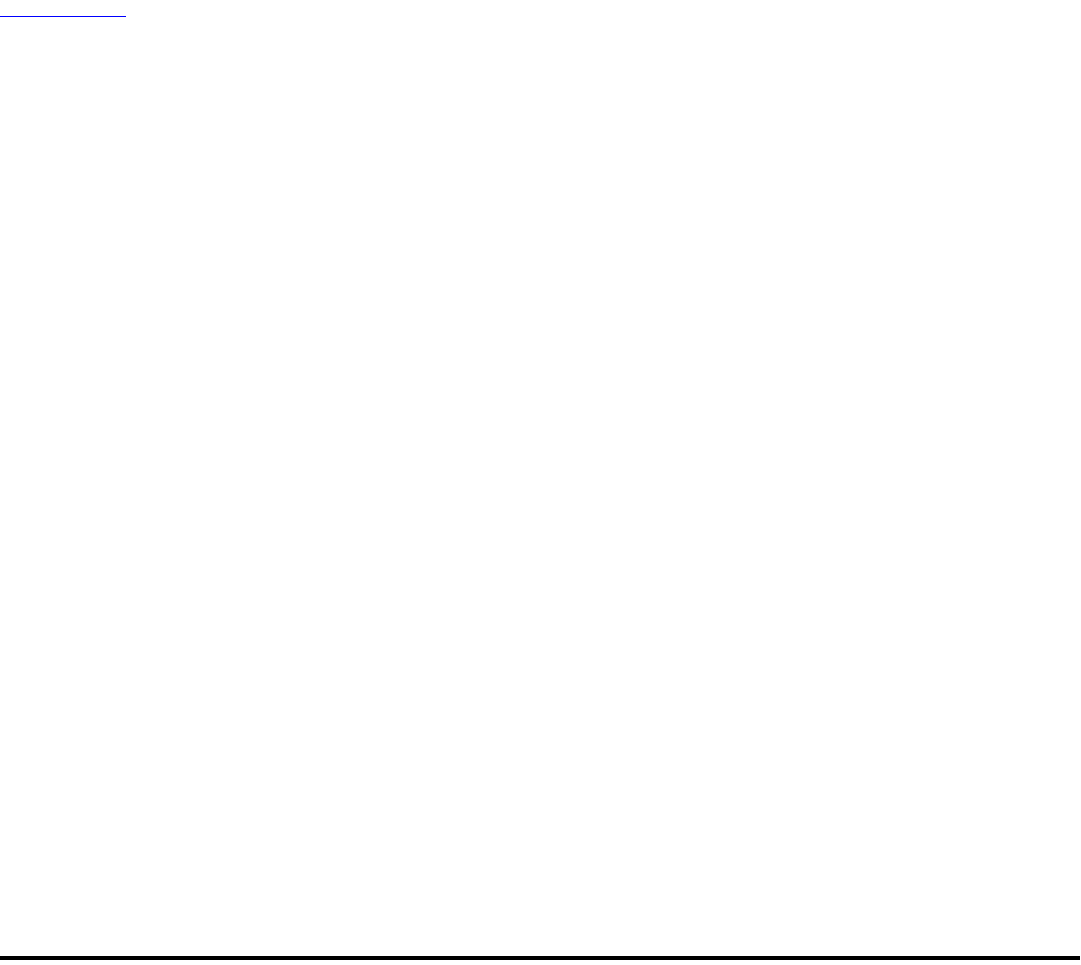
Table of Contents
service providers cease operations, and there is no guarantee that we could replace these providers on a timely basis with comparably priced providers. Recent
volatility in fuel prices, disruptions to capital markets and the current economic downturn in general have subjected certain of these third-party service
providers to strong financial pressures. Any material problems with the efficiency and timeliness of contract services, resulting from financial hardships or
otherwise, could have a material adverse effect on our business, financial condition and results of operations.
We rely on third party distribution channels and must manage effectively the costs, rights and functionality of these channels.
We rely on third party distribution channels, including those provided by or through global distribution systems, or GDSs (e.g., Amadeus, Sabre and
Travelport), conventional travel agents and online travel agents, or OTAs (e.g., Expedia, Orbitz and Travelocity), to distribute a significant portion of our
airline tickets and we expect in the future to continue to rely on these channels and hope eventually to use them to distribute and collect revenues for ancillary
products (e.g., fees for selective seating). These distribution channels are more expensive and at present have less functionality in respect of ancillary product
offerings than those we operate ourselves, such as our call centers and our website. Certain of these distribution channels also effectively restrict the manner
in which we distribute our products generally. To remain competitive, we will need to manage successfully our distribution costs and rights, increase our
distribution flexibility and improve the functionality of third party distribution channels, while maintaining an industry-competitive cost structure. Any
inability to manage our third party distribution costs, rights and functionality at a competitive level or any material diminishment or disruption in the
distribution of our tickets could have a material adverse effect on our competitive position and our results of operations.
Further, on April 21, 2011, we filed an antitrust lawsuit against Sabre in Federal District Court for the Southern District of New York. The lawsuit, as
amended to date, alleges, among other things, that Sabre has engaged in anticompetitive practices to preserve its monopoly power by restricting our ability to
distribute our products to our customers. The lawsuit also alleges that these actions have prevented us from employing new competing technologies and has
allowed Sabre to continue to charge us supracompetitive fees. The lawsuit seeks both injunctive relief and money damages. Sabre filed a motion to dismiss
the case, which the court denied in part and granted in part in September 2011 allowing two of the four counts in the complaint to proceed. We intend to
pursue these claims vigorously, but there can be no assurance of the outcome of this litigation.
Changes in government regulation could increase our operating costs and otherwise harm our business.
Airlines are subject to extensive regulatory requirements. In the last several years, Congress has passed laws, and the DOT, the FAA, the TSA and the
Department of Homeland Security have issued a number of directives and other regulations. These requirements impose substantial costs on airlines.
The FAA from time to time issues directives and other regulations relating to the maintenance and operation of aircraft that require significant
expenditures or operational restrictions. Some FAA requirements cover, among other things, retirement and maintenance of older aircraft, security measures,
collision avoidance systems, airborne windshear avoidance systems, noise abatement, other environmental concerns, fuel tank inerting, crew scheduling,
aircraft operation and safety and increased inspections and maintenance procedures to be conducted on older aircraft. Our failure to timely comply with these
requirements has in the past and could in the future result in fines and other enforcement actions by the FAA or other regulators. Additionally, the FAA
recently finalized rules on pilot flight and duty times, which could increase our costs and reduce staffing flexibility.
Our airline subsidiaries are obligated to collect a federal excise tax, commonly referred to as the "ticket tax," on domestic and international air
transportation. Our airline subsidiaries collect the ticket tax, along with certain other U.S. and foreign taxes and user fees on air transportation, and pass along
the collected amounts to the appropriate governmental agencies. Although these taxes are not our operating expenses, they represent an additional cost to our
customers. There are a number of efforts in Congress and in other countries to raise different portions of the various taxes imposed on airlines and their
passengers.
Most major U.S. airports impose a passenger facility charge ("PFC"). The ability of airlines to contest increases in this charge is restricted by federal
legislation, DOT regulations and judicial decisions. With certain exceptions, air carriers pass these charges on to passengers. However, our ability to pass
through PFCs to our customers is subject to various factors, including market conditions and competitive factors. The current cap on the PFC is $4.50 per
passenger, although there are efforts to raise the cap to a higher level before Congress.
20



